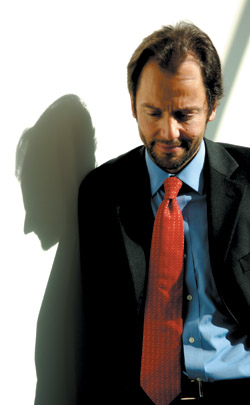 |
|
|
Trust pays off Luigi Zingales, the Robert C. McCormack professor of entrepreneurship and finance, often arrives en retard. His tardiness needn’t come as a surprise—it’s in his nature. “Italians are always late,” he says, looking the part of a European scholar with his 5 o’clock shadow and camel-colored coat. Such information is “useful to know,” he suggests, and may even influence whether different nationalities will work together.
In fact, studying cultural stereotypes can help to explain what makes the global economy tick. Preconceptions “have quite an important influence in international trade,” says Zingales, who earned his bachelor’s at Italy’s Bocconi University and his doctorate at MIT. Collaborating with visiting economics professor Luigi Guiso and Northwestern’s Paola Sapienza, he has documented how such biases—by influencing the relative trust one country has in another—affect economic exchange. A lack of mutual trust, they found, leads to less trade and investments between private companies. “We’re trying to understand why trust levels differ so much,” Zingales says from his fifth-floor Graduate School of Business office. “If we can better understand this mechanism, we can try to overcome it.” To analyze the issue, the trio first needed to establish the trust-culture connection—beyond the objective characteristics, such as geographical distance or common language, that people put stock in when sizing up their foreign partners. “In the absence of that information,” Zingales notes, “you revert to cultural stereotypes.” Focusing on Europe, the professors looked at three cultural traits: past conflicts between countries, religious similarities, and shared ethnic origins. Public-opinion surveys conducted by Eurobarometer on behalf of the European Commission provided that data and respondents’ attitudes toward the market. More important, the questionnaires recorded how much trust the participants had in citizens of each EU member state. Next the researchers used the answers to compute mean responses by state, showing that neither close proximity nor common language alone affects the relative faith one country has in another. For instance, the British and French—separated only by the English Channel—tend not to trust each other. Something beyond the objective is at work. The three cultural factors, according to the team’s research, play a significant role in forming trust. Fewer ethnic ties lowered respondents’ confidence in foreigners by more than 6 percent. The number of years their states had been at war in the last millennia also mattered. And between states where 90 percent of the population shared the same religion, as with Italy and Spain, trust rose 30 percent. Ethnicity and religion, Zingales notes, are particularly powerful indicators. The professors set out to demonstrate that trust directs trade, creating a mathematical model that measures the likelihood that two parties will pursue a business opportunity. The model calculates the opportunity’s total value minus the exploration cost. Plugging the value into an equation that factors in trust, they found that the opportunity will not be pursued if confidence is too low. The minimum trust level necessary changes with the expected profitability—to give the opportunity a try, confidence typically must be high when potential profits are low, and vice versa. For example, Zingales says, when IBM wanted to create the first PC and was desperately looking for an operating system, it turned to Apple’s Steve Jobs. Jobs, afraid IBM would take advantage of him because of its self-serving reputation, declined to meet—and missed out on his company becoming a Microsoft. Thus trust and preconceptions have a stake in economic exchange. Going one step further, Zingales, Guiso, and Sapienza estimated trust’s effect on trade of goods and services, international portfolio diversification, and foreign direct investments. Inserting relative trust and financial data—from the global Organisation for Economic Co-operation and Development and the investment-research provider Morningstar—into traditional models of exchange across countries, they showed confidence level is statistically significant. The theoretical and empirical results, which are being prepared for publication, offer a possible explanation for some nations’ inability to boost their market appeal—and cause for a makeover. “The magnitude is big,” Sapienza says. “If cultural biases are driving economic exchange, it would be beneficial to remove prejudice.” Countries such as Turkey, whose reputations work against them in the business world, Zingales suggests, can try to increase their perceived trustworthiness. For such nations, he says, “there is a large pay-off in publicity campaigns in other countries.” Of course, “trying to explain the success and failure of nations,” he continues, requires digging deeper into the inner workings of international trade. The trio hopes to explore additional variables affecting trade—an educated populace, for instance, seems more promarket—having concluded in the study that “perceptions rooted in culture are important (and generally omitted) determinants of economic exchange.” Their related research on religion and economics within countries, rather than between them, has already generated interest in the relationship. Using data from the World Values Survey, a collection of questionnaires on values and beliefs in 55 countries between 1981 and 1997, the professors examined attitudes toward equality and incentives, private and government ownership, and competition. They discovered some links between religiosity and support of the free-market system. Zingales discussed those findings, published in the January 2003 Journal of Monetary Economics, at an October gathering of the Divinity School’s Wednesday lunch series. Religion, he said, is good for economic development since churchgoers are generally more promarket. Among religions, Muslims are more pro-state and antimarket; Christians and Buddhists are less pro-state and more promarket. Some of the religious-studies students and scholars in the audience expressed skepticism, arguing that not all Muslims, Christians, and Buddhists feel that way. “These things are generalizations,” Zingales admitted. “It’s important not to be narrow-minded and say, Because of this, everybody is the same.” Even he sometimes breaks his own customs. He arrived at the Div School luncheon two minutes early.—M.L. |
|
phone: 773/702-2163 | fax: 773/702-8836 | uchicago-magazine@uchicago.edu

 Investigations
Investigations